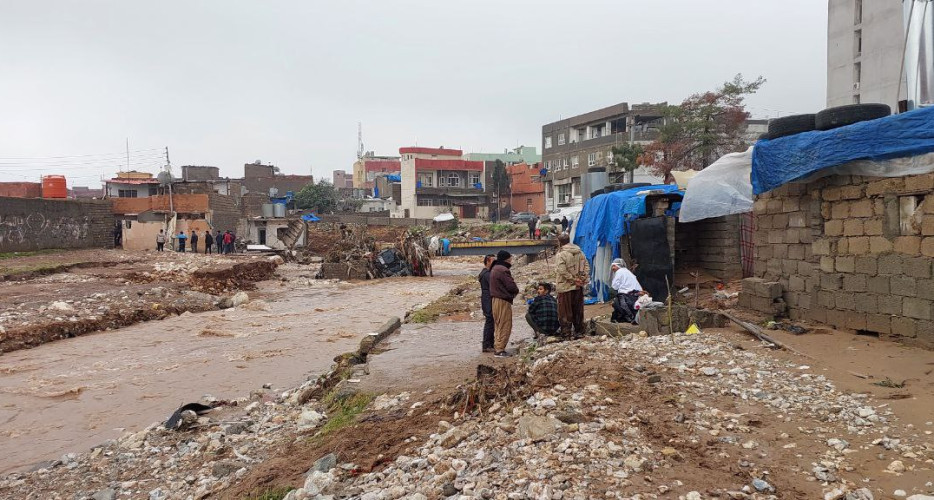
Peregraf- Ammar Aziz
The Kurdistan Region will need all the water it can get come summer, but the rains are both a blessing and a danger for Jaafar Gurgo's family. Their house lies on the banks of the heavily polluted Hshkaroo Stream in the center of Duhok city.
"Every time it rains, we are afraid that the water from the Hshkaroo will rise and enter our house," Gurgo told Peregraf.
His house has flooded six times during winter rains. Once he was given 500,000 Iraqi dinars ($3,333 at market rates) in compensation, but is usually left to clean up on his own. He said that he plans to move away as soon as he can afford it.
During the floods that hit Duhok on 19 March 2024, Hshkaroo stream once again caused misery and damage to local people, Most of the houses damaged by the floods were those around the Stream, killing three people, 50 vehicles and 160 houses were damaged, and 11 people were injured.
"Two people drowned in the water in Nzarke neighborhood, another person was electrocuted and later died due to serious injuries, and 120 people were rescued," Bewar Abdulaziz, spokesman for the Duhok Civil Defense, told Peregraf.
A decade ago, the government in Duhok promised to build an $80 million project to clean up the stream and ensure that it does not flood. The plan was first proposed by former Governor Tamar Kochar, but only 11 percent of the development is complete.
"I have lived here for 28 years. I have seen so much suffering that it would take me hours to tell. When our house flooded, I only saved my children. Our TV, refrigerator, and household items were all destroyed," he said.
While the danger of flooding recedes during the dry, summer months, the lack of water means that the Hshkaroo essentially becomes an open sewer.
"We have no rest because of the smell of sewage and the dozens of small animals and insects that it attracts…we can't sit in front of the air conditioner because of the bad smell," Gurgo said.
Ismail Mustafa, spokesperson for the Duhok municipality, told Peregraf that the authorities have slowly been making improvements. Teams clean the watercourse every year during the rainy season and last year they built 500 square meters last year of retaining wall to prevent flooding, he said.
"It would definitely be great if the project was reworked," conceded Mustafa.
Flood prevention and sanitation on the Hashkroo is emblematic of the lack of progress on basic infrastructure in Duhok governorate.
Tahir Saeed’s house is just 300 meters away from Hshkaroo Stream. Speaking to Peregraf, he wondered aloud why hundreds of projects are implemented in Duhok each year, but the stream is neglected.
"The smell of this stream is like poison. It affects everyone and, even if the water is recycled, it could have many benefits," Saeed said.
According to an informed source who spoke to Peregraf on condition of anonymity, funding for the stream project has been diverted for other uses.
During the current cabinet, which is led by Kurdistan Regional Government (KRG) Prime Minister Masrour Barzani and took office in 2019, more than 930 projects have been implemented in Duhok governorate alone.
"We don't have anything yet to complete the Hshkaroo Stream project because we have more important projects for the people," Duhok Deputy Governor Majid Sayed Salih told Peregraf. He said that the focus is currently on water, electricity, road, and health projects.
He said that the plan for the stream will ensure that water and sewage are separated and that the area around it can be used as a tourist area.
"The [Hshkaroo] project requires a lot of budget and there is no money, so it has been stopped," he said, adding that Iraq’s federal government has not sent the Kurdistan Region’s budget share.
Duhok governorate consists of seven districts and 31 sub-districts. It has major trade routes and pumps half of the oil in the Kurdistan Region, but is the poorest governorate in the semi-autonomous zone. It hosts many internally displaced persons (IDPs) and refugees.
"There were no problems with the project, but it was stopped due to the financial crisis and the outbreak of the war against Islamic State," Deputy Governor Sayed Salih said.
"Whenever the financial situation is good and we are provided with money, this project will be implemented," he added.